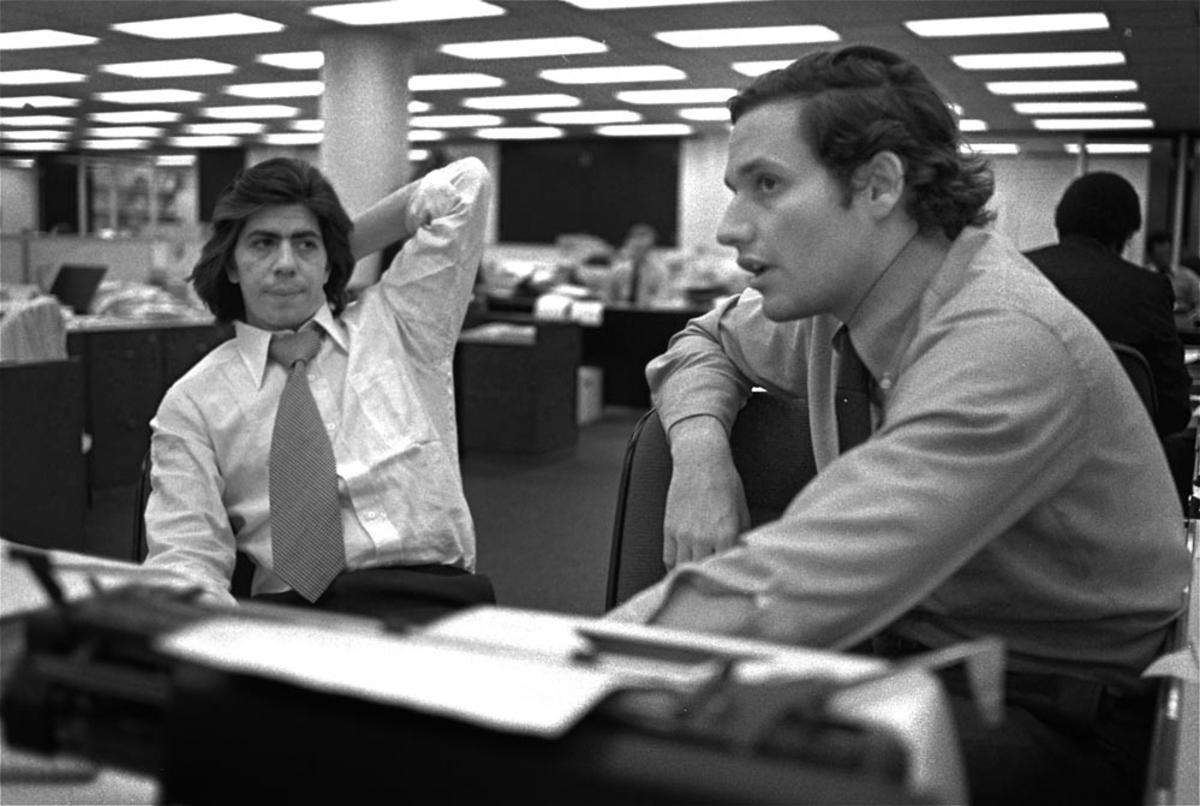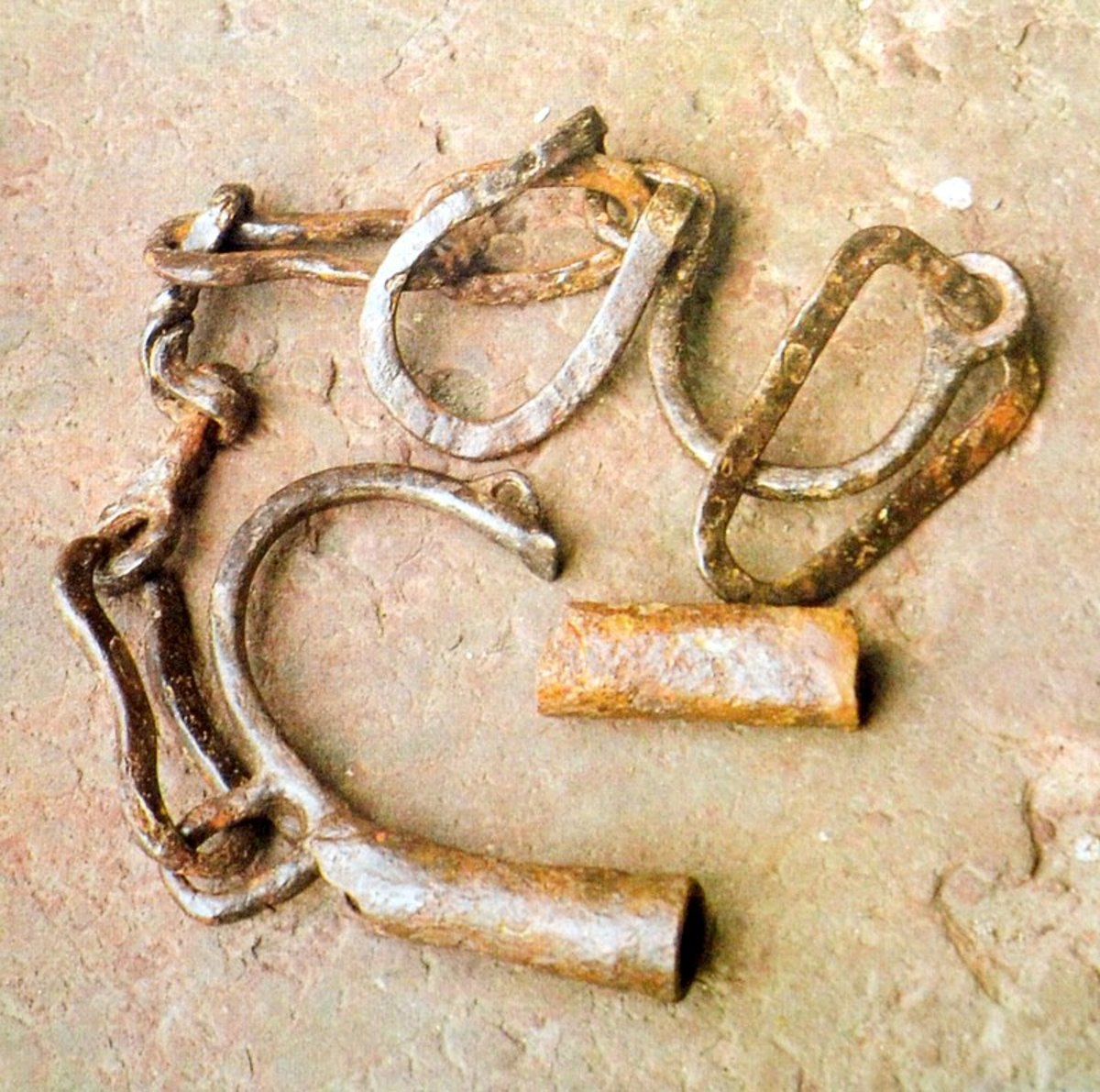Introduction to Satyagraha
Truth vs. the Bomb
I'm as new to this subject as any greenhorn. But in matters concerning differences that lead to armed conflict how is it possible that there be another way? If one side claims this, another that, then is it not time to enter into combat and let God decide? From an earthly point of view, pacifism is absurd. It is self-annihilation. Even though war mocks every single, conceivably higher notion, it is always somehow rationalized. Nations have histories, culture, and ideals to protect and defend. Their very lives are at stake. How else can this be accomplished, if threatened by an outside force, except by way of arms? Still, there are those who uphold a loftier vision. They steadfastly refuse to resort to weapons and all the rigamarole that goes along with them: salutes, epaulettes, medals, ceremonies, spit and polish, etc. They are few in number, rooted in religious inertia, and resigned to whatever ugliness fate might dole out in the way of jail time, ostracism, and marginalization as either crazy or inconsequential. But the problem for those who choose to enter into an intellectual engagement with Satyagraha is that for the most part the concept is handed down to us fully contextualized within the life and times of Mahatma Gandhi.
Before there was Gandhi, there was Gandhi
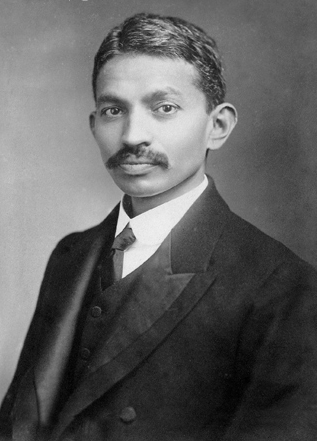
Psycho-Babble Bio
At first I thought I had made a mistake. I purchased a psycho-analytic biography of Gandhi written by Erik H. Erikson, an American author with a Nordic name. But after a while, I began to realize that he was an excellent guide into a man immersed in a culture I had no acquaintance with except by way of the movies. There will always be that Academy Award winning film, Gandhi (1982), to stand in the path of any piece of literature or spoken comment on the subject. Nevertheless, in today's arms-laden world it is perhaps more important than ever to come to grips with a counter-argument that centers on non-violence. The concept itself is never used as an excuse to surrender to oppression or injustice. It is a way of fighting. Certainly, this is the case with Gandhi, whose best rhetoric was always bolstered by militant expressions. It is just that, to him, the word, "fight", had uncommon meanings and nuances.
Gandhi's biographer was a professional analyst, so readers must bear with ample comments on his attachment, conscious or unconscious, to his mother, with stoic endurance. Rephrasing militant tendencies into psycho-sexual meta-language is yet another nuisance. But there is definitely something psychological on a grand scale about the man's obsession with diet. There are leaders who are riveting when it comes to speeches, stumping, rallies, fund-raising, or the visual-aural pageantry of military and non-military exhibitions. Others affect a variety of personality styles, many of which work well on camera and off, if a series of privileged recollections are believable. But Gandhi was himself a spectacle. His mastery over the usual litany of natural urges that bring many political careers to a dead halt is something to admire. In addition, his ability to turn weakness into strength, as well as the opposite, is truly mind-bending.
Is Non-Violence a Viable Alternative to War?
Do you believe in the power of non-violence?
The Roots of Nonviolence
There is no avoiding the mystical. Apparently, vegetarianism is not irrelevant. Not eating meat teaches one to not do something, at the very least, as well as abstain from a form of unpunished violence. Nonetheless, it would be aburd to think of rejecting a practitioner of nonviolence on the basis of his or her eating habits. There is also the inexplicable fact that the greatest known killer in history did not eat meat (surely not Nazi propaganda?). The contradictions fall away when focus is brought to bear exclusively on Mahatma Gandhi. It was in his preparation for leadership by means of grappling with these and other matters of personal attention and habitude that it all comes clear. What the author only gets started after a good hundred and fifty pages is that from personal experience -- not books, degrees, legal fees, or the influence of a dominating personage -- Gandhi came to realize that Indians would always be subservient to the English unless something decisive were done about it.
But what? How? When? There were prominent revolutionaries at the time. They had followings. One was a Hindu Nationalist (Tilak). Another a Gradualist (Gokhale), who favored constitutional reform. It seems reasonable to assume that the British were not going to give much ground without a fight, and that Indians were in no position to confront an Empire. Gandhi, incidentally, admired Boer soldiers, approved of their assistance with ambulance services, and was acquainted firsthand with the violence of the Second Boer War. But a military operation would not be his model. It would only impress upon him that much more the need for a circuitous route that would result in a permanent victory just as if won on a battlefield.
There were certain kinds of mistreatment foisted upon Indians by the English that could not be mistaken for right by any thinking, feeling person. Gandhi learned his first lessons in South Africa. There, the Black Act, for instance, demanded the registration of all Indians at the age of eight -- fingerprints and all. Gandhi thought that with meetings and probably newspapers he could move people emotionally to demand reforms. Nevertheless, his was an era different from our own, which is somewhat hardened against unfairness and injustice, if only because there is so much. All the same, the present is thoroughly integrated with a medium that brings every event from wherever into our living rooms. Thus, even if sympathy is out of the question, dry-eyed outrage is not beyond the pale. Public opinion matters.
The Flag of the British East India Co. 1801
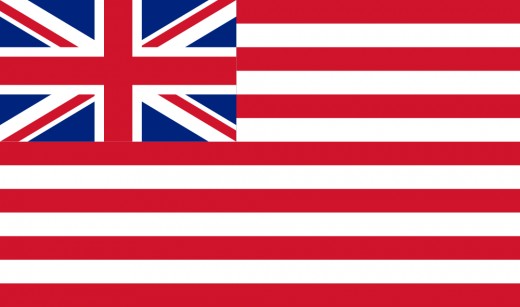
First Words
After a certain point, Gandhi begins to speak. Though an ardent advocate of passive resistance, his words are strong and often harsh. The English, he says, are weakening Indians, who, if independent, are capable of Home Rule. He describes many of his contemporaries as "terrified men". They can rise up. Indeed, they must. In fact, they will. But not with firearms and the like. Sometimes he rails against the English and its Parliament -- compared to a prostitute, under one' s man's rule, then another and another -- and sometimes he rails against Western Civilization. His main audience consists of a mixture of Muslims and Hindus. Clearly, Gandhi has surfaced, if only in a state of semi-preparation at best. He has not completely thought things through, especially his animosity against "Machinery". But he cannot wait indefinitely, nor can India, especially in the undesirable, abused, languishing capacity as England's favorite "cash cow".
He reminds his audiences that many more speak Hindi than English. He does not refrain from telling them that they are better at Hindi than English, which has numerous variants, depending upon where it is being spoken. Though the English are unapologetically making use of India to make themselves rich, he tells Indians not to be like them. He would not last long perhaps in today's global arena, addicted to multi-trillion dollar markets. Nevertheless, this is now, that was then. He also sermonizes on how historically Indians have deliberately refrained from activities that would make money, preferring poverty for reasons modern readers will find hard to fathom. To me, I see a leader changing the usually accepted terms of battle before the battle is joined. Not only will victory not go to the stronger; the wealthier, too, will lose. The overall reasons have to do with the fact that it is the fate of India, not England, that is at stake. India, not England, is the home turf, to which allegiance is owed, though the country is thoroughly accustomed to English domination in every shape, way, and form.
Textiles
It was in Ahmedabad, then capital of Gandhi's home state of Gujarati, where the man assumed a degree of leadership from which there was no turning back. In the movie, Gandhi seems always to be weaving, the main activity that defined Ahmedabad since ancient times. In England's East India Company, west finally meets east to its own, self-serving advantage. It successfully inaugurates a system in which precious items are bought cheaply from India, then less precious commodities sold expensively to the same source. Somehow, Gandhi will instill in his fellow countrymen a sense of nationalism that had not materialized prior to his involvement in their plight. It is one thing to insult and injure a single man, who has not the means to defend himself, but another to offend millions, who can still stand as one against a rather capable foe. The latter would argue, as it assuredly did, that India needed Great Britain more than the other way around. Indeed, many Indians would not have disagreed. It was Gandhi's particular genius, however, to see in the single defenseless man the secret to a bold tactic. One defenseless man connected to another and another, ad infinitum, up to millions, then hundreds of millions, created a bulwark against superior force. Contrariwise, powerful forces could not, in an enlightened and communicative age, bring might to bear against the powerless without suffering bloodless but significant losses nonetheless.
That is why Truth-Force, or Satyagraha, has a certain appeal. It also has a transcendent dimension. The Western Mind has difficulty comprehending the mere existence of collective, mental unions. But they are as real as any example of what is real the West might chance to offer in their stead. Only consider how China makes use of multitudinous work forces in order to outmaneuver Capitalist competitors, whose only remedy is to simply give up. Chinese individualism cannot be the same as ours. Somehow or other, the combined Indian spirit of independence was launched by the textile industry. It was not the factories themselves, but their dismal conditions, which English ingenuity and, if allowed, superiority, could neither address nor resolve. In Champaran, Bihar, according to the author, Gandhi gained tremendous popularity, but failed to achieve a lasting resolution, which was, in fact, the case in Ahmedabad. I beg to differ only in that Champaran involved the lowliest people, much more numerous than textile workers, who were forced to suffer inhumane neglect. Thus, Champaran, to my mind, brought Gandhi into greater prominence. The matter of success versus failure diverts from the greater issue, the potential, if not immediate application, of Satyagraha. Let it also not be forgot, that the men and women of Champaran, unable to live off a cash product, influenced Gandhi, who again and again returned to the starvation he observed firsthand.
Credibility and the Lack Thereof
To the average mind, this is more the crux of the issue. Hitler forced nearly anyone who opposed him to fight or submit. He did, in fact, collect many surrenders, which, theoretically, averted further bloodshed. To leave it at that is admittedly a rather large omission in order to advance an argument. Suffice it to say, for the moment, that submission is a strange tactic, to be sure. Only think, however, of how much a militant country, splinter, or organization can get away with in terms of overpowering the powerless. Invent, for instance, a hypothetical scenario. Suppose a nation under siege were to "fall in" or "line up", go outdoors, and stand, unarmed and helpless. The cameras are rolling. Would the world powers that be indifferently watch a million die without so much as a blink? -- each individually and in any manner whatsoever that pleased an unredeemable enemy? How about two million? Two and a half? All this regardless of who they were, including the incapacitated, elderly, weak, and unfit. Such people were singled out in Mein Kampf as not just superfluous but parasitical burdens to be eliminated.
There is indeed a competing theory that war is hygienic. It tends to weed out the unwanted. Who are the unwanted? Anybody and everybody. The dead, ex post facto, must have been them. To think in this fashion is to resurrect an old corollary, that an enemy is a virus. All in all, it is sufficient, I think, merely to point out how complicated the problem is. Personally, I prefer to stand alongside Gandhi, knowing how indiscriminate violence is, favoring no one. But I would do so scratching my head the whole while, unable to rid myself of questions that promise to remain unanswered. In fact, eventually, they turn into prayers. One must remember that Gandhi never seemed to budge from Satyagraha, however extreme, suitable to all circumstances. To him, it is universal and absolute, whereas the more conventional mind sees it as an impressive tool, if called upon under certain prescribed conditions. To be sure, it made a game-changing impression at the Dharasana Salt Works. One must also keep in mind that Satyagraha must satisfy the aggressor, too. As much as we might all like to be Satyagrahis, in today's situations, it might also be God's will that certain types vanish from the face of the earth forever.
The Inevitable
April 13, 1919. Amritsar, in the Punjab. Several thousand, perhaps as many as ten thousand, gather peacefully behind high garden walls. Brigadier General Reginald Dyer commands his troops to fire. Three hundred and seventy-nine are killed, one thousand one hundred and thirty seven injured. It does not take long. Hardly a bullet is wasted. Dyer is immediately hailed a hero by the British Rag, basically English rule in India, Pakistan, and Bangladesh. Indians look helpless, their cause hopeless. But then, miraculously, a neutral, objective conscience materializes, as if out of nowhere. A year later, the House of Commons ends Dyer's career. Standard policies undergo review and new ones are devised. To make a long story short, India, without warfare in the usual, more horrific sense, wins independence.
Naturally, that was not the end of the story. Suffice it to say that within the last hundred years, military conflict has increased the levels of danger people live with to an unprecedented extreme. Within a relatively short period of time, several military leaders have emerged, many of them ours, who have excelled, to put it mildly, under difficult conditions. Somehow, they have risen to the occasion. Perhaps I am only opening myself up to ridicule, but I place Gandhi among them. There is no denying, too, that in today's struggles and skirmishes, ordinary people play a significant part. As to where it all leads, I do not know, except to express another miserably weak belief that no matter how the world works out its woes, some form of Satyagraha, or Truth-Force, will ultimately prove victorious.
The Jallianwall Bagh Garden Massacre
